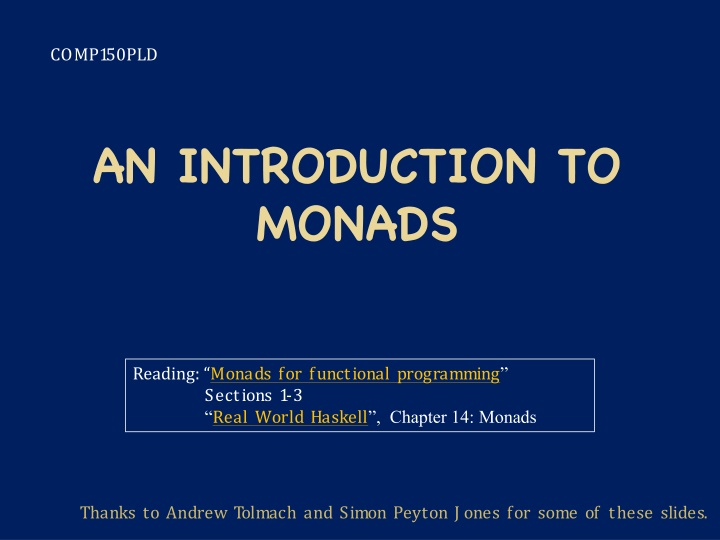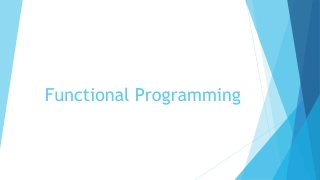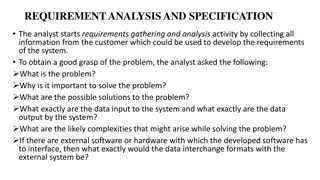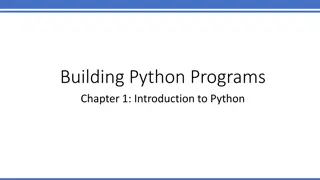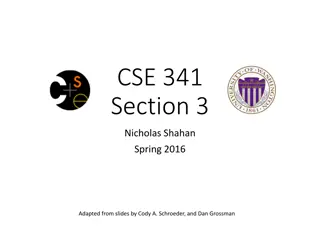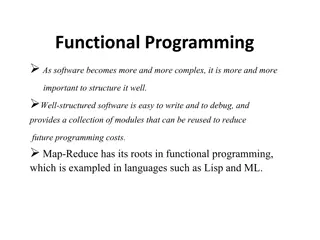Introduction to Monads: Functional Programming Concepts
Monads are essential in functional programming, enabling sequencing of actions, handling side effects, and managing data flow. This introduction covers key concepts such as IO monad basics, sequencing actions, using do notation, and the benefits and drawbacks of explicit data flow in programming languages.
Download Presentation

Please find below an Image/Link to download the presentation.
The content on the website is provided AS IS for your information and personal use only. It may not be sold, licensed, or shared on other websites without obtaining consent from the author.If you encounter any issues during the download, it is possible that the publisher has removed the file from their server.
You are allowed to download the files provided on this website for personal or commercial use, subject to the condition that they are used lawfully. All files are the property of their respective owners.
The content on the website is provided AS IS for your information and personal use only. It may not be sold, licensed, or shared on other websites without obtaining consent from the author.
E N D
Presentation Transcript
COMP150PLD AN INTRODUCTION TO MONADS Reading: Monads for functional programming Sections 1-3 Real World Haskell , Chapter 14: Monads Thanks to Andrew Tolmach and Simon Peyton J ones for some of these slides.
Notes on the Reading Monads for functional programming uses unit instead of return instead of >>= But it is talking about the same things. Real World Haskell , Chapter 14, uses running examples introduced in previous chapters. You don t need to understand all that code, just the big picture.
Reviewing IO Monad Basic actions in IO monad have side effects : getChar :: IO Char putChar :: Char -> IO () isEOF :: IO Bool Do combines actions into larger actions: echo :: IO () echo = do { b <- isEOF; if not b then do { x <- getChar; putChar x; echo } else return () } Operations happen only at the top level where we implicitly perform an operation with type runIO :: IO a -> a -- Doesn t really exist
do and bind The special notation do {v1 <- e1; e2} is syntactic sugar for the ordinary expression e1 >>= \v1 -> e2 where >>=(called bind) sequences actions. (>>=) :: IO a -> (a -> IO b) -> IO b The value returned by the first action needs to be fed to the second; hence the 2nd arg to >>= is a function (often an explicit lambda).
More about do Actions of type IO()don t carry a useful value, so we can sequence them with >>. (>>) :: IO a -> IO b -> IO b e1 >> e2 = e1 >>= (\_ -> e2) The full translation for do notation is: do { x<-e; es } = e >>= \x -> do { es } do { e; es } = e >> do { es } do { e } = e do {let ds; es} = let ds in do {es}
Explicit Data Flow Pure functional languages make all data flow explicit. Advantages Value of an expression depends only on its free variables, making equational reasoning valid. Order of evaluation is irrelevant, so programs may be evaluated lazily. Modularity: everything is explicitly named, so programmer has maximum flexibility. Disadvantages Plumbing, plumbing, plumbing!
An Evaluator data Exp = Plus Exp Exp | Minus Exp Exp | Times Exp Exp | Div Exp Exp | Const Int eval :: Exp -> Int eval (Plus e1 e2) = (eval e1) + (eval e2) eval (Minus e1 e2) = (eval e1) - (eval e2) eval (Times e1 e2) = (eval e1) * (eval e2) eval (Div e1 e2) = (eval e1) `div` (eval e2) eval (Const i) = i answer = eval (Div (Const 3) (Plus (Const 4) (Const 2)))
Making Modifications To add error checking Purely: modify each recursive call to check for and handle errors. Impurely: throw an exception, wrap with a handler. To add logging Purely: modify each recursive call to thread a log. Impurely: write to a file or global variable. To add a count of the number of operations Purely: modify each recursive call to thread count. Impurely: increment a global variable. Clearly the imperative approach is easier!
Adding Error Handling Modify code to check for division by zero: data Hope a = Ok a | Error String eval1 :: Exp -> Hope Int -- Plus, Minus, Times cases omitted, but similar. eval1 (Div e1 e2) = case eval1 e1 of Ok v1 -> case eval1 e2 of Ok v2 -> if v2 == 0 then Error "divby0" else Ok (v1 `div` v2) Error s -> Error s Error s -> Error s eval1 (Const i) = Ok i Yuck!
Adding Error Handling Modify code to check for division by zero: data Hope a = Ok a | Error String eval1 :: Exp -> Hope Int -- Plus, Minus, Times cases omitted, but similar. eval1 (Div e1 e2) = case eval1 e1 of Ok v1 -> case eval1 e2 of Ok v2 -> if v2 == 0 then Error "divby0" else Ok (v1 `div` v2) Error s -> Error s Error s -> Error s eval1 (Const i) = Ok i Note: whenever an expression evaluates to Error, that Errorpropagates to final result.
A Useful Abstraction We can abstract how Errorflows through the code with a higher-order function: ifOKthen :: Hope a -> (a -> Hope b) -> Hope b e `ifOKthen` k = case e of Ok x -> k x Error s -> Error s eval2 :: Exp -> Hope Int -- Cases for Plus and Minus omitted eval2 (Times e1 e2) = eval2 e1 `ifOKthen` (\v1 -> eval2 e2 `ifOKthen` (\v2 -> Ok(v1 * v2))) eval2 (Div e1 e2) = eval2 e1 `ifOKthen` (\v1 -> eval2 e2 `ifOKthen` (\v2 -> if v2 == 0 then Error "divby0" else Ok(v1 `div` v2))) eval2 (Const i) = Ok i
A Pattern... Compare the types of these functions: ifOKthen :: Hope a -> (a -> Hope b) -> Hope b Ok :: a -> Hope a -- constructor for Hope (>>=) :: IO a -> (a -> IO b) -> IO b return :: a -> IO a The similarities are not accidental! Like IO, Hopeis a monad. IOthreads the world through functional code. Hopethreads whether an error has occurred. Monads can describe many kinds of plumbing!
Monads, Formally A monad consists of: A type constructor M A function return :: a -> M a A function >>= :: M a -> ( a -> M b) -> M b Where >>= and return obey these laws: (1) return x >>= k = k x (2) m >>= return = m (3) m1 >>= (\x->m2 >>= \y->m3) = (m1 >>= \x->m2) >>= \y->m3 x not in free vars of m3
Verifying that Hope is a Monad e `ifOKthen` k = case e of Ok x -> k x Error s -> Error s First Monad Law: return x >>= k = k x Ok x `ifOKthen` k = case Ok x of Ok x -> k x Error s -> Error s = k x Second Monad Law: m >>= return = m m `ifOKthen` Ok = case m of Ok x -> Ok x Error s -> Error s = m Third Monad Law (left as an exercise) m1 >>= (\x->m2 >>= \y->m3) = (m1 >>= \x->m2) >>= \y->m3
Many Monads A monad consists of: A type constructor M A function return :: a -> M a A function >>= :: M a -> ( a -> M b) -> M b So, there are many different type (constructors) that are monads, each with these operations.... ...that sounds like a job for a type (constructor) class!
Recall Type Classes We can overload operators to work on many types: (==) :: Int -> Int -> Bool (==) :: Char -> Char -> Bool (==) :: [Int]-> [Int]-> Bool Type classes and instances capture this pattern: class Eq a where (==) :: a -> a -> Bool ... instance Eq Int where (==) = primIntEq instance Eq a => Eq [a] where (x:xs) == (y:ys) = x==y && xs == ys ...
Recall Type Constructor Classes We can define type classes over type constructors: class HasMap c where -- HasMap = Functor map :: (a->b) -> c a -> c b instance HasMap [] where map f [] = [] map f (x:xs) = f x : map f xs instance HasMap Tree where map f (Leaf x) = Leaf (f x) map f (Node(t1,t2)) = Node(map f t1, map f t2) instance HasMap Opt where map f (Some s) = Some (f s) map f None = None We can do the same thing for monads!
The Monad Constructor Class The Haskell Prelude defines a type constructor class for monadic behavior: class Monad m where return :: a -> m a (>>=) :: m a -> (a -> m b) -> m b The Prelude defines an instance of this class for the IO type constructor. The do notation works over any instance of class Monad.
Hope, Revisited We can make Hope an instance of Monad: instance Monad Hope where return = Ok (>>=) = ifOKthen And then rewrite the evaluator to be monadic eval3 :: Exp -> Hope Int -- Cases for Plus and Minus omitted but similar eval3 (Times e1 e2) = do { v1 <- eval3 e1; v2 <- eval3 e2; return (v1 * v2) } eval3 (Div e1 e2) = do { v1 <- eval3 e1; v2 <- eval3 e2; if v2 == 0 then Error "divby0" else return (v1 `div` v2)} eval3 (Const i) = return i
Compare -- Div case, non-monadic case eval1 (Div e1 e2) = case eval1 e1 of Ok v1 -> case eval1 e2 of Ok v2 -> if v2 == 0 then Error "divby0" else Ok (v1 `div` v2) Error s -> Error s Error s -> Error s -- Div case, monadic case eval3 (Div e1 e2) = do { v1 <- eval3 e1; v2 <- eval3 e2; if v2 == 0 then Error "divby0" else return (v1 `div` v2)} The monadic version is much easier to read and modify.
Adding Tracing Modify (original) interpreter to generate a log of the operations in the order they are done. evalT :: Exp -> [String] -> ([String], Int) -- Minus, Times, Div cases omitted, but similar. evalT (Plus e1 e2) s = let (s1,v1) = evalT e1 s (s2,v2) = evalT e2 s1 in (s2++["+"], v1 + v2) evalT (Const i) s = (s++[show i], i) expA = (Div (Const 3) (Plus (Const 4) (Const 2))) (traceTA,answerTA) = evalT expA [] -- (["3","4","2","+","/"],0) More ugly plumbing!
Tracing Monad We can capture this idiom with a tracing monad, avoiding having to explicitly thread the log through the computation. data Tr a = Tr [String] a instance Monad Tr where return a = Tr [] a m >>= k = let (trace, a) = runTr m (trace , b) = runTr (k a) in Tr (trace++trace') b -- runTr lets us "run" the Trace monad runTr :: Tr a -> ([String], a) runTr (Tr s a) = (s,a) -- trace adds argument to the log trace :: String -> Tr () trace x = Tr [x] ()
Eval with Monadic Tracing evalTM :: Exp -> Tr Int -- Cases for Plus and Minus omitted but similar evalTM (Times e1 e2) = do { v1 <- evalTM e1; v2 <- evalTM e2; trace "*"; return (v1 * v2) } evalTM (Div e1 e2) = do { v1 <- evalTM e1; v2 <- evalTM e2; trace "/"; return (v1 `div` v2) } evalTM (Const i) = do{trace (show i); return i} answerTM = runTr (evalTM expA) -- (["3","4","2","+","/"],0) Which version would be easier to modify?
Adding a Count of Div Ops Non-monadically modifying the original evaluator to count the number of divisions requires changes similar to adding tracing: thread an integer count through the code update the count when evaluating a division. Monadically, we can use a state monad ST, parameterized over an arbitrary state type. Intuitively: type ST s a = s -> (a, s) The IO monad can be thought of as an instance of the ST monad, where the type of the state is World. IO = ST World type IO a = World -> (a, World)
The ST Monad First, we introduce a type constructor for the new monad so we can make it an instance of Monad: newtype State s a = ST {runST :: s -> (a,s)} A newtype declaration is just like a datatype, except It must have exactly one constructor. Its constructor can have only one argument. It describes a strict isomorphism between types. It can often be implemented more efficiently than the corresponding datatype. The curly braces define a record, with a single field named runST with type s -> (a,s). The name of the field can be used to access the value in the field: runST :: State s a -> s -> (a,s)
The ST Monad, Continued We need to make ST s an instance of Monad: newtype ST s a = ST {runST :: s -> (a,s)} instance Monad (ST s) where return a = ST (\s -> (a,s)) m >>= k = ST (\s -> let (a,s') = runST m s in runST (k a) s') return :: a -> ST s a a a return s s
The ST Monad, Continued We need to make ST s an instance of Monad: newtype ST s a = ST {runST :: s -> (a,s)} instance Monad (ST s) where return a = ST (\s -> (a,s)) m >>= k = ST (\s -> let (a,s') = runST m s in runST (k a) s') >>= :: ST s a -> (a -> ST s b) -> (ST s b) result a m k a s s_res s
Operations in the ST Monad The monad structure specifies how to thread the state. Now we need to define operations for using the state. -- Get the value of the state, leave state value unchanged. get :: ST s s get = ST (\s -> (s,s)) -- Make put's argument the new state, return the unit value. put :: s -> ST s () put s = ST (\_ -> ((),s)) -- Before update, the state has value s. -- Return s as value of action and replace s with f s. update :: (s -> s) -> ST s s update f = ST (\s -> (s, f s))
Counting Divs in the ST Monad evalCD :: Exp -> ST Int Int -- Plus and Minus omitted, but similar. evalCD (Times e1 e2) = do { v1 <- evalCD e1; v2 <- evalCD e2; return (v1 * v2) } evalCD (Div e1 e2) = do { v1 <- evalCD e1; v2 <- evalCD e2; update (+1); return (v1 `div` v2) } evalCD (Const i) = do{return i} -- Increment state by 1. (\x->x+1) answerCD = runST (evalCD expA) 0 -- (0,1) 0 is the value of expA, 1 is the count of divs. The state flow is specified in the monad; eval can access the state w/o having to thread it explicitly.
The Real ST Monad The module Control.Module.ST.Lazy, part of the standard distribution, defines the ST monad, including the getand putfunctions. It also provides operations for allocating, writing to, reading from, and modifying named imperative variables in ST s: -- From Data.STRef.Lazy data STRef s a newSTRef :: a -> ST s (STRef s a) readSTRef :: STRef s a -> ST s a writeSTRef :: STRef s a -> a -> ST s () modifySTRef :: STRef s a -> (a -> a) -> ST s () Analogous to the IORefs in the IO Monad.
Monad Menagerie We have seen many example monads IO, Hope (aka Maybe), Trace, ST, Non-determinism There are many more... Continuation monad STM: software transactional memory Reader: for reading values from an environment Writer: for recording values (like Trace) Parsers Random data generators (e.g, in Quickcheck) Haskell provides many monads in its standard libraries, and users can write more.
Operations on Monads In addition to the do notation, Haskell leverages type classes to provide generic functions for manipulating monads. -- Convert list of a actions to single [a] action. sequence :: Monad m => [m a] -> m [a] sequence [] = return [] sequence (m:ms) = do{ a <- m; as<-sequence ms; return (a:as) } -- Apply f to each a, sequence resulting actions. mapM :: Monad m => (a -> m b) -> [a] -> m [b] mapM f as = sequence (map f as) -- lift pure function in a monadic one. liftM :: Monad m => (a -> b) -> m a -> m b -- and the many others in Control.Monad
Composing Monads Given the large number of monads, it is clear that putting them together is useful: An evaluator that checks for errors, traces actions, and counts division operations. They don t compose directly. Instead, monad transformers allow us to stack monads: Each monad M typically also provides a monad transformer MT that takes a second monad N and adds M actions to N, producing a new monad that does M and N. Chapter 18 of RWH discusses monad transformers.
Summary Monads are everywhere! They hide plumbing, producing code that looks imperative but preserves equational reasoning. The do notation works for any monad. The IO monad allows interactions with the world. The ST monad safely allows imperative implementations of pure functions. Slogan: Programmable semi-colons. The programmer gets to choose what sequencing means.
A Monadic Skin In languages like ML or J ava, the fact that the language is in the IO monad is baked in to the language. There is no need to mark anything in the type system because IO is everywhere. In Haskell, the programmer can choose when to live in the IO monad and when to live in the realm of pure functional programming. Interesting perspective: It is not Haskell that lacks imperative features, but rather the other languages that lack the ability to have a statically distinguishable pure subset.
The Central Challenge Arbitrary effects Useful No effects Useless Dangerous Safe
The Challenge of Effects Plan A (everyone else) Arbitrary effects Nirvana Useful Plan B (Haskell) No effects Useless Dangerous Safe
Two Basic Approaches: Plan A Arbitrary effects Default = Any effect Plan = Add restrictions Examples Regions Ownership types Vault, Spec#, Cyclone
Two Basic Approaches: Plan B Default = No effects Plan = Selectively permit effects Types play a major role Two main approaches: Domain specific languages (SQL, Xquery, Google map/reduce) Wide-spectrum functional languages + controlled effects (e.g. Haskell) Value oriented programming
Lots of Cross Over Plan A (everyone else) Arbitrary effects Nirvana Useful Envy Plan B (Haskell) No effects Useless Dangerous Safe
Lots of Cross Over Plan A (everyone else) Arbitrary effects Nirvana Useful Ideas; e.g. Software Transactional Memory (retry, orElse) Plan B (Haskell) No effects Useless Dangerous Safe
An Assessment and a Prediction One of Haskell s most significant contributions is to take purity seriously, and relentlessly pursue Plan B. Imperative languages will embody growing (and checkable) pure subsets. -- Simon Peyton J ones
